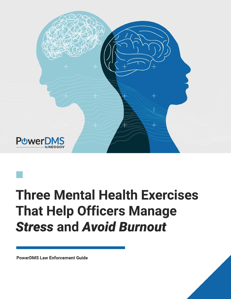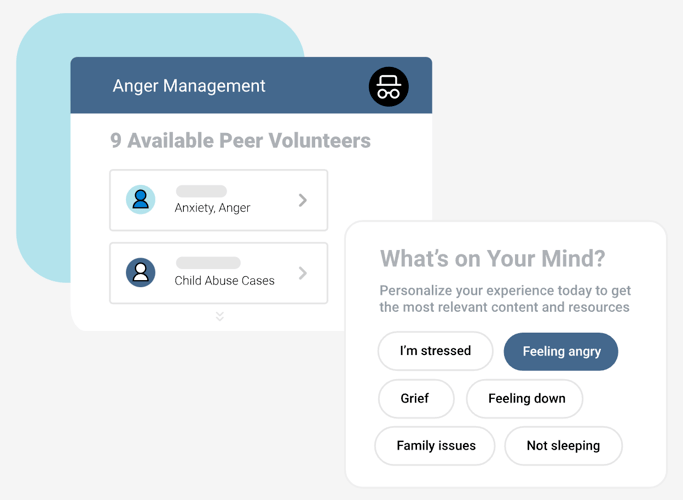Article highlights:
Five ways to support law enforcement officer wellness:
- Assess your officer training
- Encourage proper physical health
- Re-evaluate your scheduling
- Provide law enforcement wellness programs
- Invest in mental wellness apps
A career in law enforcement is not for the faint of heart. Officers have to be physically and mentally fit to effectively manage the high-risk challenges of the job, which often involve daily encounters with violence, trauma, and loss.
Despite law enforcement officers' exemplary strength, no one is indestructible. The pressure of police work comes with a significant toll. A 2013 study found the life expectancy of police officers was almost 22 years lower than the average American, and this isn’t happenstance.
By nature, if pressure continues to build without relief, it will reach a breaking point. For law enforcement, this often comes in the form of burnout, fatigue, and stress – all of which can negatively impact their mental and physical health, their relationships, and their work.
"The life expectancy of police officers was almost 22 years lower than the average American."
The unprecedented obstacles facing law enforcement today – from chronic understaffing and overworking to national scrutiny – are forcing agencies to address the growing decline in officer wellness.
If you’re reading this, that means your agency is probably looking for answers, too – and we’re here to help. Let’s examine five ways you can support the wellbeing of your law enforcement officers and set them up for success.
1. Assess your officer training
Your training program plays an essential role in teaching law enforcement officers how to succeed at the job. It’s not just an opportunity to instill proper behavior, but also reinforce habits of wellness.
If officers aren't prepared to cope with life-altering encounters in the field, they won't be equipped for a sustainable career in law enforcement. Ensure your field training officers are informing trainees about:
- The importance of maintaining physical and mental health in law enforcement
- Support resources available to officers, both through your agency and other accessible systems (peer groups, online resources, mental wellness apps, etc.)
- Effective practices to help officers balance work and their personal lives
Many officers hesitate to seek wellness support for fear of being judged or considered unfit for duty. But incorporating this into your training program shows them from the start that it’s not only okay to seek help – it’s also essential to a successful law enforcement career.
2. Encourage proper physical health
Stress, strenuous activity, and irregular hours put law enforcement officers at greater risk of experiencing health issues, including high cholesterol, obesity, and sleep deprivation. These can lead to various life-threatening cardiovascular problems like high blood pressure and heart disease.
But consistent exercise and a nutritious diet can help lower these risks. Remind your officers to keep up with their physical health on a regular basis. Here are a few things you might do to educate and encourage them:
- Include reminders in your weekly departmental announcements
- Invite officers to share their favorite healthy recipes with the team
- Provide resources for creating a meal plan and daily exercise routine
- Host department potlucks and/or group workouts
Officer wellness is an ongoing process and your agency shares a responsibility to support the wellbeing of your workforce. Doing so will benefit your officers’ performance and livelihood, as well as your services to the community.
3. Re-evaluate your scheduling
Demanding shift schedules are another factor driving the decline in officer wellness. Law enforcement’s 24-hour scheduling systems often work against officers’ natural sleep instincts, which can inhibit their ability to remain consistently well-rested.
According to one study, police officers are 25% more sleep-deprived than the general population – and today’s understaffing issues are only making it worse. This lack of sleep can increase burnout, cause errors at work, and lead to more absences due to illness.
"Police officers are 25% more sleep-deprived than the general population."
Law enforcement scheduling is complex and changing your system isn’t easy. But even giving officers flexibility in small ways can support improved wellness.
Offer options for shift-bidding and/or shift-swapping to give officers a greater sense of autonomy over their work schedules, even if they don’t always get their requested shifts. Additionally, you can offer more consistent shift schedules so officers can build and settle into a regular routine, which helps them keep up with healthy activities and avoid sleep deprivation.
Whether your agency implements one or all of these scheduling flexibilities, making a change will provide officers with more opportunities to find a balance that fits their individual needs and progress toward better wellbeing.
4. Provide law enforcement wellness programs
Your agency can proactively support officer wellbeing by providing law enforcement wellness programs with comprehensive resources. These give officers access to guidance, education, and insights on important wellness topics, such as:
- Physical fitness and nutrition
- Smoking, drugs, and alcohol
- Stress management
- Mental health
- Fatigue and sleep apnea
- Peer support
Considering the sensitivity of mental health in law enforcement, a balanced officer wellness program ensures officers have a reliable, trustworthy way to get the support they need. In 2019, the Steamboat Springs Police Department implemented a wellness program to help normalize mental health conversations, with the goal of making officers comfortable addressing their hardships before they develop into more serious issues.
Law enforcement wellness programs can better equip officers to lead happier, healthier lives at work and at home. Not only does this improve their productivity and overall safety on the job – it also reduces the likelihood of absenteeism or resignation from your department.
|
Cognitive Behavior Therapy (CBT) is a simple and effective mental health exercise, proven to reduce problems associated with stress and burnout in law enforcement. Download our informative CBT eBook to learn how you can leverage this empowering clinical practice. |
 |
5. Invest in mental wellness apps
In 2021, research by Walden University found that less than 20% of officers studied sought help for confirmed mental health issues due to preconceived stigmas. But without proper guidance, the high-pressure, high-stress situations law enforcement officers face daily are more likely to cause burnout, PTSD, depression, or further tragedy.
"Less than 20% of officers studied sought help for confirmed mental health issues due to preconceived stigmas."
Mental wellness apps can enhance the health and wellbeing of law enforcement professionals by knocking down common barriers that prevent officers from seeking support. PowerDMS's one-stop app for officer wellbeing, PowerLine, was made with input from industry professionals to specifically support the unique challenges of working in law enforcement.
PowerLine gives individuals across all ranks in your department 24/7 access to essential support, including:
- Comprehensive library of wellbeing content (videos, articles, and audio), plus integration with your agency’s established resources
- National network of volunteer peers who understand officers’ experiences and who officers can anonymously connect with, both individually and in group sessions
- Complete anonymity of user activity so officers can confidently access support

Solutions like PowerLine can enhance law enforcement wellness programs by giving officers access to comprehensive and anonymous resources for their wellbeing. Investing in a mental wellness app can help agencies make a positive impact on their officers' wellbeing almost overnight.
Even if the other four options mentioned above aren't possible right away, providing an app like PowerLine can give officers the support they need in the palms of their hands.
|
|
|
Leveraging all five – or even just one – of the solutions discussed here can significantly benefit officer wellness in your law enforcement agency. You’ll improve the overall health, safety, and performance of your officers, as well as your services to the community – but that’s not all.
Your commitment to supporting the wellbeing of those who put their lives on the line each day shows that your department cares about people. That’s the heart of public safety, after all – and a legacy you will feel proud to lead.